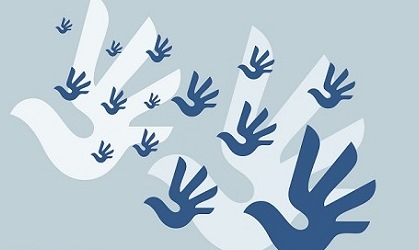International Conference 2015
"30 Years of Children's Philosophy in Austria Human Rights - Philosophy as a Way of Life".
from October 15 - 18, 2015 in Graz/Austria.
The increasing global conflicts, from contrasts between value and cognition orientation to worldviews, mean to face new major challenges. Especially also in the field of tension of diverging cultures conflicts of life forms show up - they point to a close coupling between facts of life and the diversity of life forms, problems of intercultural understanding and cooperation. The central issue is a redefinition of the relations between chances and dangers in the 21st century.
Transformation processes in the direction of specific new forms of enlightened democratization, increasingly based on human rights, offer opportunities for new forms of living together and for increased cooperation between different cultures. In this lie new potentials for integration and inclusion. As a result, entirely new forms of interrelationships between communicative structures of action and forms of life can emerge.
This involves the important renewal of relationships between interculturality, cultural/ethnic identities, interdisciplinarity and transdisciplinarity on the one hand, and cultural diversity on the other.
The complexity of globalization processes conceals "new thinking". In the field of education, this is reflected in the transformation of educational curricula. It is precisely here that the congress sets itself the goal of taking up the increasingly intense, critical debates - about the meaning of "educational plans" - and generating new concepts. This, in turn, requires the development of specific strategies with the aim of promoting critical, creative and empathetic thinking, intercultural dialogue and the emergence of new identities that can emerge within the possibilities of our commitment to a shared coexistence.
Philosophizing with children and adolescents will become increasingly indispensable in the future, as it contributes to the promotion of perceptual, interpretive, argumentative, as well as critical reflection and judgment skills, and because of its "enlightenment-oriented" self-understanding, it can mediate between science and the living world and strengthen reflective potential.
Philosophizing is a practice of conscious use of language, an attentive and alert listening, looking, and perceiving, which leads to a critical, open-minded attitude that does not allow world views to be imposed on it. The goal is for children and young people to orient themselves in a pluralistic, democratic society through their own thinking and to be able to shape their lives in a self-determined way and also to contribute themselves to both advancing and better justifying democratic degrees of freedom.
This reflective confrontation with different ideas, conceptions and ways of life can not only help to reduce violence and aggression, but also develop solution strategies and offer conflict resolution aids.
The aim of the congress is to discover the diversity of forms of life, to promote intercultural and interdisciplinary dialogue and exchange between different philosophical approaches and theories in the context of today's world. Research and practice-oriented projects, including philosophizing with children and adolescents, will be presented and re-examined.
The Austrian Society for Philosophy of Children is organizing its already traditional congress with the aim of building bridges to various scientific disciplines in addition to a philosophical debate, thus making explicit further knowledge bases both for educational concepts and, beyond that, for educational policy initiatives.
The topics of the congress will focus on the following areas:
- Philosophy and human rights
- Understanding democracy
- Community of Inquiry
- Philosophy and cultural diversity
- Diversity of life forms
- Philosophy of language
- Connections between communication and life forms
- Inter- and Transdisciplinarity - Multiculturalism
- Lifelong Learning: Philosophical Perspectives and Education
- Philosophy and educational processes
- Expectation horizons of children and adolescents

